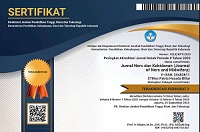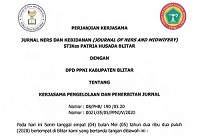The Correlation of the Open Dry Treatment to Umbilical Cord Separation Time on Newborns
DOI:
https://doi.org/10.26699/jnk.v9i1.ART.p079-083Keywords:
open dry umbilical cord, umbilical cord care, umbilical cord separation timeAbstract
According to East Java health profile (2019), the number of neonatal tetanus is 10 cases because of inappropriate treatment. Thus, bacteria enter the body and prolong the umbilical cord separation time. WHO (2010) and Ministry of Health Republic of Indonesia (2015) recommend umbilical cord care using an open dry method. This study attempts to identify the correlation of the open dry treatment to umbilical cord separation time according to literary results. Literature review was used to analyze the data from three online databases: PubMed, Google Scholar, and DOAJ using inclusion-exclusion criteria. The keywords were “Umbilical Dry Cord Care,â€â€œDay of Release of the Umbilical Cord,†“PerawatanTali Pusat Kering Terbuka,†and “Lama PelepasanTali Pusat.†The analysis method was compared and contrast. Based on 16 articles, the results showed three categories of umbilical cord separation time by using the open dry method. Four articles indicated the fast category (< 5 days), other ten as normal (5-7 days), and the other two the slow category (> 7 days). The accurate method for the umbilical cord care is open dry because the separation time is the fastest. However, further research using primary data is needed.References
Al-Shehri, H. (2019). The Use of Alcohol versus Dry Care for the Umbilical Cord in Newborns: A Systematic Review and Meta-analysis of Randomized and Non-randomized Studies. Cureus, 11(7). https://doi.org/10.7759/cureus.5103 diakses pada tanggal 8 Juli 2020 pukul 08.00 WIB
Asiyah, N. (2017). Perawatan Tali Pusat Terbuka Sebagai UpayaPelepasan. I(I), 29–36. diakses pada tanggal 6 Juli 2020 pukul 08.00 WIB
Astari, R. Y., & Nurazizah, D. (2019). Perbandingan Metode Kolostrum dan Metode Terbuka Terhadap Lama Pelepasan Tali Pusat pada Bayi Baru Lahir. Faletehan Health Journal, 3(6), 91–98. diakses pada tanggal 6 Juli 2020 pukul 08.00 WIB
BKKBN, BPS, & Kemenkes RI. (2018). Survei Demografi dan Kesehatan Indonesia 2017.
Diana, S. (2017). Model Asuhan Kebidanan Continuity of Care. In e-BOOK STIKES PoltekkesMajapahit.http://103.38.103.27/repository/index.php/EPOL/article/download/839/640 diakses pada tanggal 3 Juli 2020 pukul 08.00 WIB
Guen, C. G. Le, dkk. (2017). Dry care versus antiseptics for umbilical cord care: a cluster randomized trial.Pediatrics, 139(1). https://doi.org/10.1542/peds.2016-1857 diakses pada tanggal 8 Juli 2020 pukul 08.10 WIB
Jamil, siti nurhasiyah, Sukma, F., & Hamidah. (2017). Buku Ajar Asuhan Kebidanan Pada Neonatus, Bayi, Balita dan Anak Pra Sekolah. http://elearning.fkkumj.ac.id/pluginfile.php?file=%2F8663%2Fcourse%2Foverviewfiles%2FASUHAN NEONATUS%2C BAYI%2C BALITA DAN ANAK PRA SEKOLAH.pdf&forcedownload=1 diakses pada tanggal 6 Juli 2020 pukul 08.10 WIB
Kementerian Kesehatan Republik Indonesia. (2013). Buku Saku Pelayanan Kesehatan Neonatal Esensi. 23–28.
Kementerian Kesehatan Republik Indonesia. (2020). Buku Kesehatan Ibu dan Anak (KIA).Jakarta: Kementerian Kesehatan dan JICA (Japan International Cooperation Agency)
Kemenkes RI. (2019). Profil Kesehatan Indonesia 2018 [Indonesia Health Profile 2018]. http://www.depkes.go.id/resources/download/pusdatin/profilkesehatan-indonesia/Data-an-Informasi_Profil-Kesehatan-Indonesia-2018.pdf diakses pada tanggal 15 Juli 2020 pukul 10.00 WIB
Kholidati, Ratna. (2019). Efektifitas Perawatan Tali Pusat Dengan Tehnik Tertutup dan Terbuka Terhadap Penyembuhan Luka Tali Pusat Pada Bayi Baru Lahir Di Rsia Fauziyah Tulungagung. Jurnal Ilmu Kesehatan. 7(2). 305-401. diakses pada tanggal 6 Juli 2020 pukul 10.00 WIB
Leante Castellanos, dkk (2019). Recommendations for the care of the umbilical cord in the newborn. Anales de PediatrÃa (English Edition), 90(6), 401.e1-401.e5. https://doi.org/10.1016/j.anpede.2019.01.009 diakses pada tanggal 8 Juli 2020 pukul 09.00 WIB
Liyah, A. (2013) Resusitasi Neonatal. Jakarta: Perkumpulan Perinatologi Indonesia.
Lopez-Medina, M. D., dkk. (2020). Umbilical cord separation time, predictors and healing complications in newborns with dry care. PLoS ONE, 15(1), 1–17. https://doi.org/10.1371/journal.pone.0227209 diakses pada tanggal 8 Juli 2020 pukul09.00 WIB
Lyngdoh, D., dkk. (2018). Effect of topical application of human breast milk versus 4% chlorhexidine versus dry cord care on bacterial colonization and clinical outcomes of umbilical cord in preterm newborns.Journal of Clinical Neonatology, 7(1), 25. https://doi.org/10.4103/jcn.jcn_91_17 diakses pada tanggal 8 Juli 2020 pukul 10.00 WIB
Mallick, L., dkk. (2019). Trends, determinants, and newborn mortality related to thermal care and umbilical cord care practices in South Asia.BMC Pediatrics, 19(1), 1–16. https://doi.org/10.1186/s12887-019-1616-2 diakses pada tanggal 10 Juli 2020 pukul 8.00 WIB
Marmi, (2018). Asuhan Neonatus, Bayi, Balita, dan Anak Prasekolah. Yogyakarta: Pustaka Pelajar
Nursalam, Kusnanto, dkk (2020). Pedoman Penyusunan Skripsi - Literature Review Dan Tesis - Systematic Review. 3 Desember 2020 pukul 8.00 WIB
Pitria, Risa. (2017). Umbilical Cord Care Effectiveness Closed and Open To Release Cord Newborn. Jurnal Doppler Universitas Pahlawan Tuanku Tambusai. 1(2), 58-64. diakses pada tanggal 7 Juli 2020 pukul 09.00 WIB
Prawirohardjo, Sarwono. (2014). Buku Panduan Praktis Pelayanan Kesehatan Maternal dan Neonata. Jakarta: Yayasan Bina Pustaka Sarwono Prawirohardjo
Quattrin, R., dkk. (2016). 70% Alcohol Versus Dry Cord Care in the Umbilical Cord Care. Medicine (United States), 95(14), 1–5. https://doi.org/10.1097/MD.0000000000003207 diakses pada tanggal 9 Juli 2020 pukul 10.00 WIB
Reni, D. P., dkk. (2018). Perbedaan Perawatan Tali Pusat Terbuka Dan Kasa Kering Dengan Lama Pelepasan Tali Pusat Pada Bayi Baru Lahir. PLACENTUM: Jurnal Ilmiah Kesehatan Dan Aplikasinya, 6(2), 7. https://doi.org/10.20961/placentum.v6i2.22772 diakses pada tanggal 1 Agustus 2020 pukul 09.00 WIB
Sondakh, Jenny. (2013). Asuhan Kebidanan Persalinan dan Bayi baru lahir. Jakarta: Erlangga
Sukarni, D., dkk. (2012). Perbedaan Lama Pelepasan Tali Pusat antara Perawatan terbuka dan Tertutup pada Bayi Baru Lahir di Bidan Praktik Mandiri Soraya Kecamatan Kemuning Palembang, 5(2), 29–36. diakses pada tanggal 2 Agustus 2020 pukul 08.00 WIB
Susianti. (2017). Hubungan Perawatan Tali Pusat Dengan Lama Lepas Tali Pusat Pada Bayi Baru Lahir Di Puskemas Lakessi Kota Parepare. Jurnal Kesehatan Lentera Acitya. 4(4).37-42. diakses pada tanggal 10 Agustus 2020 pukul 8.00 WIB
Trijayanti, W. R., Martanti, L. E., & Wahyuni, S. (2020). Perbedaan Perawatan Tali Pusat Tertutup dan Terbuka Terhadap Lama Pelepasan Tali Pusat. Midwifery Care Jorunal, 1(2), 13–23. diakses pada tanggal 10 Agustus 2020 pukul 8.00 WIB
Yuliana, F., dkk. (2017). Metode Perawatan Tali Pusat Terbuka pada Bayi di Ruang Bayi RSUD Ulin Bajarmasin.Dinamika Kesehatan, 8(1), 19–24. diakses pada tanggal 10 Agustus 2020 pukul 09.00 WIB
Downloads
Published
How to Cite
Issue
Section
License
Copyright (c) 2022 Jurnal Ners dan Kebidanan (Journal of Ners and Midwifery)

This work is licensed under a Creative Commons Attribution-ShareAlike 4.0 International License.






